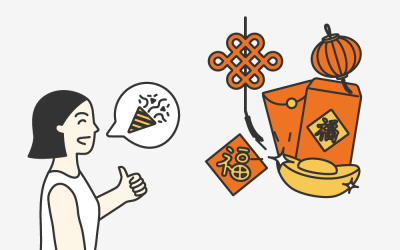The Most Useful Chinese Words and Structures to Introduce Yourself in Chinese
Imagine such a scenario, you’ve just arrived in China and you want to make some Chinese friends in order to know more about local people’s daily lives. As we all know, in order to make friends with other people, you will first need to introduce yourself. Well, if you would like to make friends with Chinese people, it will be a good idea to learn how to introduce yourself in Chinese so that you could more or less impress your “potential friends”. In this article, we would like to teach you six words and structures you need in order to introduce yourself in Chinese.
Chinese Words and Structures to Introduce Yourself

1. Greetings
你好!
Nǐ hǎo
Hello!You can start with the word “你好 (nǐ hǎo)” if you would like to learn how to introduce yourself in Chinese. This is the most common word Chinese people use when they start to introduce themselves. In this word, “你 (nǐ)” means “you”, and “好 (hǎo)” means “good”. Hence, the literal meaning of this Chinese word is “you good”. What’s hidden behind this word is probably that when Chinese people say hi to you, they also hope everything is going well with you.

2. I am …
我是 …
Wǒ shì …
I am + name
This is the key structure that you need in order to introduce yourself in Chinese. The character “是 (shì)” means “am/is/are”, and the meaning of this structure is “I am……”. You can add your name to this structure when you want to introduce yourself in Chinese. Here is an example to help you better understand how to use this structure:
Example:
我是Andy。
Wǒ shì Andy.
I’m Andy.
What you need to bear in mind is that Chinese people state their full names (surname + given name) instead of just saying their given names when they introduce themselves. In addition, a person’s surname comes before his or her given name. For example:
我是李强。
Wǒ shì Lǐ Qiáng.
I’m Li Qiang.
In the name “李强 (Lǐ Qiáng)”, “李 (Lǐ)” is this person’s surname, whereas “强 (Qiáng)” stands for the given name.

3. My name is …
我叫 …
Wǒ jiào …
My name is + name
This is another way to tell other people your name when you introduce yourself in Chinese. “叫 (jiào)” means “to call”, therefore, the literal meaning of this structure is “I’m called/My name is……”. Again you can directly add your name to this structure when you introduce yourself in Chinese.
Example:
你好,我叫Emily。
Nǐ hǎo, wǒ jiào Emily。
Hello, my name is Emily.

4. I’m from …
我是 …
Wǒ shì …
I’m + nationality.
When you introduce yourself in Chinese, you probably also want to tell other people where you come from. In Chinese, “name of the country + 人 (rén)” represents a person’s nationality, and the character “人 (rén)” means “people”. Let’s take a look at some examples to help you better understand this structure:
Examples:
我是美国人。
Wǒ shì Měi guó rén.
I’m American.
我是英国人。
Wǒ shì Yīng guó rén.
I’m British.
我是日本人。
Wǒ shì Rì běn rén.
I’m Japanese.
In these three examples, “美国 (Měiguó)”, “英国 (Yīngguó)” and “日本 (Rìběn)” mean “America”, “Britain” and “Japan” respectively.
Chinese Words and Structures to Talk About Your Occupation and Age

1. My occupation
我是 …
Wǒ shì …
I’m a + profession
Sometimes you might also want to tell other people what you do for a living when you introduce yourself in Chinese. It’s very similar to how you tell others your nationality, and what you need to do is replace your nationality by your profession.
我是老师。
Wǒ shì lǎoshī.
I’m a teacher.
我是工程师。
Wǒ shì gōngchéngshī.
I’m an engineer.
Vocabulary:
老师
lǎoshī
teacher
工程师
gōngchéngshī
engineer

2. My age
我 + … + 岁 。
Wǒ + … + suì.
I’m … years old.
It’s not acceptable to ask people’s age in most western countries. However, you can use this structure in case you want to mention your age when you introduce yourself in Chinese. The word “岁 (suì)” can be translated as “year(s) old”.
Example:
我二十岁。
Wǒ èrshí suì.
I’m twenty years old.
I hope you’ve learned a little bit more about self-introduction. To find out more interesting and useful vocabulary, check out one of our blog posts 7 Things About Chinese Culture First-time Travelers Should Know








0 Comments